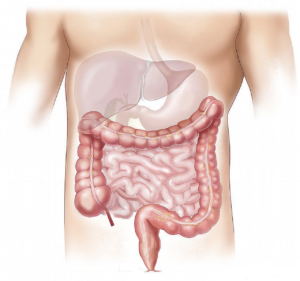There are over 100,000 new cases of colon cancer every year. Making it the third most common cancer diagnosis in both women and men in the U.S. and the third leading cause of death. According to the American Cancer Society, “Overall, the lifetime risk of developing colorectal cancer is: about 1 in 23 (4.3%) for men and 1 in 25 (4.0%) for women.”
A few risk factors that can increase your chances of colon cancer include:
Older adults
Colon cancer is typically seen in people over 50, but it can be diagnosed at any age. In fact, there has been an increase in people younger than 50.
Family history of polyps or cancer
 If you or a blood relative has had noncancerous or cancerous colon polyps, then you will be at an increased risk in the future.
If you or a blood relative has had noncancerous or cancerous colon polyps, then you will be at an increased risk in the future.
Low fiber & high fat diet
A diet high in calories and fat, low in fiber are associated with colon and rectal cancer. Some studies have found people with a diet high in processed and red meat are at an increase risk of colon cancer.
Obesity
Those who are overweight are at an increase risk of colon cancer.
A sedentary lifestyle
When compared to those who get regular physical activity, an inactive lifestyle contributes to the development colon cancer.
Diabetes
People who are insulin resistant or have diabetes are also at an increase risk.
Smoking & alcohol
Both smoking and heavy alcohol usage have a greater chance of colon and rectal cancer.
Preventing colon cancer with routine screening
The American Cancer Society advocates regular colorectal cancer screening start at age 45, for those at average risk.
Reduce your risk
You can reduce your risk of developing colon cancer with a few lifestyle changes. The Mayo Clinic recommends these steps:
Eat a variety of fruits, vegetables and whole grains
 Fruits, vegetables and whole grains contain vitamins, minerals, fiber and antioxidants, which may play a role in cancer prevention. Choose a variety of fruits and vegetables so that you get an array of vitamins and nutrients.
Fruits, vegetables and whole grains contain vitamins, minerals, fiber and antioxidants, which may play a role in cancer prevention. Choose a variety of fruits and vegetables so that you get an array of vitamins and nutrients.
Drink alcohol in moderation, if at all. If you choose to drink alcohol, limit the amount of alcohol you drink to no more than one drink a day for women and two for men.
Stop smoking. Talk to your doctor about ways to quit that may work for you.
Exercise most days of the week. Try to get at least 30 minutes of exercise on most days. If you’ve been inactive, start slowly and build up gradually to 30 minutes. Also, talk to your doctor before starting any exercise program.
Maintain a healthy weight. If you are at a healthy weight, work to maintain your weight by combining a healthy diet with daily exercise. If you need to lose weight, ask your doctor about healthy ways to achieve your goal. Aim to lose weight slowly by increasing the amount of exercise you get and reducing the number of calories you eat.
Colon cancer screening
While nobody wants to think about having a colonoscopy, it is the best way to detect small growths called polyps. These growths have little to no symptoms.
A healthy colon is vital for overall good health and absorbing essential nutrients.
 As a major organ, the colon, is known as the large intestine. It’s responsible for more than removing waste from the body. After the enzymes and muscles in your stomach break down food, this creamy liquid moves into the small intestine. This is where nutrients and vitamins are absorbed from the food. What’s left over, moves into the colon. Where salts and liquids are reabsorbed for the body to use.
As a major organ, the colon, is known as the large intestine. It’s responsible for more than removing waste from the body. After the enzymes and muscles in your stomach break down food, this creamy liquid moves into the small intestine. This is where nutrients and vitamins are absorbed from the food. What’s left over, moves into the colon. Where salts and liquids are reabsorbed for the body to use.
There are a number of conditions that can affect the colon. polyps, Colon cancer, hemorrhoids, Crohn’s disease, irritable bowel syndrome, colitis, and diverticular disease.
Preventative screening and testing help detect diseases and conditions in their early and most treatable stages. For more information or to make an appointment, contact Gastroenterology Consultants of Central Florida.
